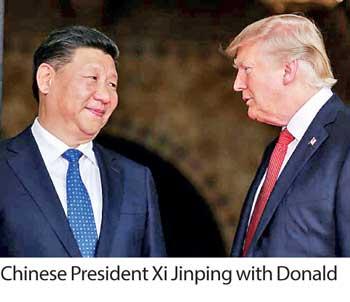Reply To:
Name - Reply Comment
 BEIJING (AFP) - The trade war between the United States and China escalated yesterday as Beijing threatened to unleash “counter measures” against US plans to impose tariffs on US$300 billion in Chinese goods.
BEIJING (AFP) - The trade war between the United States and China escalated yesterday as Beijing threatened to unleash “counter measures” against US plans to impose tariffs on US$300 billion in Chinese goods.
President Donald Trump jolted US and Asian stock markets as he issued the threat just a day after US and Chinese trade negotiators revived talks aimed at ending the year-long dispute.
“China expresses its strong dissatisfaction and resolute opposition to this,” foreign ministry spokeswoman Hua Chunying said at a regular press briefing.
“If the US implements the tariff measures, China will have to take necessary counter-measures to resolutely defend the core interests of the country and its people,” Hua said, adding that Beijing did not want a trade war “but is not afraid to fight one if necessary.”
She did not specify what kind of measures China would take, but in the past Beijing has hinted that it could restrict exports of rare earths that are vital to the US technology industry, and it is also drawing up a blacklist of “unreliable” foreign companies.
Trump’s announcement means virtually all of the US$ 660 billion in annual two-way trade between the world’s two biggest economies will have tariffs on it.
China has imposed tariffs on US$110 billion in American goods, almost all of the products it imports from the US.
Trump said 10 percent duties on US$ 300 billion will take effect September 1, and come on top of the 25 percent tariffs on US$ 250 billion in Chinese imports already in place. Trump later raised the possibility he could increase the duties to “well beyond” 25 percent. “The 10 percent is for a short-term period and then I can always do much more or I can do less, depending on what happens with respect to a deal,” he said at the White House.
After resuming face-to-face talks in Shanghai this week, trade negotiators were set to reconvene in Washington in early September for another round of discussions, which means they will take place just after the new tariffs take effect.
“Slapping on tariffs is definitely not a constructive way to resolve economic and trade frictions, it’s not the correct way,” Chinese Foreign Minister Wang Yi said on the sidelines of a regional meeting of top diplomats in Bangkok yesterday. When he announced the tariffs on Twitter, Trump said Beijing had agreed “to buy agricultural product from the US in large quantities but did not do so.”